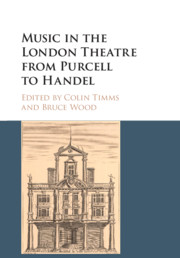Book contents
- Frontmatter
- Contents
- List of Figures
- List of Music Examples
- Notes on Contributors
- Preface
- Introduction
- I FROM PURCELL TO HANDEL
- II HANDEL AND ITALIAN OPERA
- 6 Ombra mai fu: Shades of Greece and Rome in the Librettos for Handel's London Operas
- 7 Handel and the Uses of Antiquity
- 8 From Metastasio's Alessandro to Handel's Poro: A Change of Dramatic Emphasis
- 9 Deidamia as an ‘Heroi–comi–pastoral’ Opera
- III HANDEL AND ENGLISH WORKS IN THE THEATRE
- Bibliography
- Index
8 - From Metastasio's Alessandro to Handel's Poro: A Change of Dramatic Emphasis
from II - HANDEL AND ITALIAN OPERA
Published online by Cambridge University Press: 10 June 2017
- Frontmatter
- Contents
- List of Figures
- List of Music Examples
- Notes on Contributors
- Preface
- Introduction
- I FROM PURCELL TO HANDEL
- II HANDEL AND ITALIAN OPERA
- 6 Ombra mai fu: Shades of Greece and Rome in the Librettos for Handel's London Operas
- 7 Handel and the Uses of Antiquity
- 8 From Metastasio's Alessandro to Handel's Poro: A Change of Dramatic Emphasis
- 9 Deidamia as an ‘Heroi–comi–pastoral’ Opera
- III HANDEL AND ENGLISH WORKS IN THE THEATRE
- Bibliography
- Index
Summary
the lovers of Italian Poetry, as well as vocal music … regard Metastasio as the panting source of their most exquisite delight in the union of those arts. But this poet has still higher claims on our resource and affection, from his innoxious life and moral character, which gives a kind of dignity to innocent pleasures, and to humanity.
Such was Charles Burney's high opinion of Metastasio, expressed in the preface to his 1796 edition of selected letters by the poet. By that date there must have been over a thousand musical settings of Metastasio's twenty-seven librettos. Some of them had been set, often in much altered versions, over fifty times, ranging from the operas of Vinci and Porpora in the 1720s to Mozart's La clemenza di Tito in 1791.
Metastasio's reputation as a fine poet and dramatist was formed in Italy between 1724 and 1730, beginning with his first original drama, Didone abbandonata, written when he was twenty-six. It was set by Domenico Sarri as the principal opera of the 1724 carnival season at Naples. Such was the impact of this dramma per musica that over the next six years impresarios, both in Metastasio's home city of Rome and in Venice, vied with each other for the privilege and financial reward of being the first to present a new drama by this young poet (see Table 8.1).
All seven of these historical dramas (1724–30) were to prove amongst the most popular of the poet's works, being set repeatedly throughout the next fifty years. This was particularly true of the pair of dramas that Metastasio wrote for the 1730 carnival in Rome, Alessandro nell'Indie and Artaserse. It was this success and Metastasio's accumulated reputation that secured for him the coveted post of Poet to the Imperial court in Vienna, a position that he held for over fifty years, from 1730 until his death in 1782. During this lengthy period his dramas came to be regarded as the epitome of court opera. In many cases he presented ‘a drama of moral forces personified by specified characters who are differentiated by emotionally charged actions and reactions that drive them towards either personal moral victory or moral self-defeat …
- Type
- Chapter
- Information
- Music in the London Theatre from Purcell to Handel , pp. 114 - 125Publisher: Cambridge University PressPrint publication year: 2017



